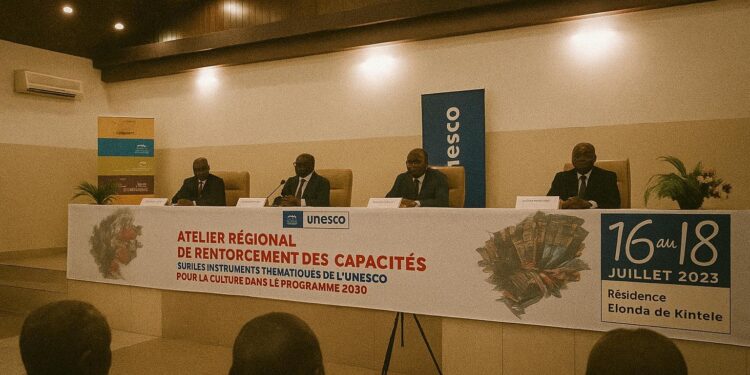Brazzaville Convenes Regional Thought-Leaders
The sultry July air of Brazzaville did little to temper the quiet sense of purpose that pervaded the opening of the regional capacity-building seminar on UNESCO’s Culture|2030 Indicators. Representatives of eight Central African states, senior Congolese officials and multilateral partners assembled with the shared conviction that culture, often celebrated yet rarely quantified, must now be captured in the language of metrics. The three-day gathering, supported by UNESCO and the International Organisation of La Francophonie, signals an inflection point in the sub-region’s quest to anchor culture in national development strategies.
A Policy Catalyst Long Hiding in Plain Sight
In his keynote address, Lis Pascal Moussodji, speaking for the Ministry of Cultural Industries, framed the initiative as a transition from rhetoric to evidence. His observation that “better evaluation is better governance” found resonance among delegates who acknowledge that culture’s contribution to social cohesion and innovation has often been inferred rather than demonstrated. That rhetorical gap is visible across Africa, where less than one quarter of states systematically capture the economic weight of cultural industries according to recent African Union data. Brazzaville’s seminar therefore responds to the continental call, echoed in Agenda 2063, to transform soft-power assets into hard statistics capable of guiding fiscal choices.
From Data Scarcity to Metric Sophistication
UNESCO’s Culture|2030 framework, piloted since 2019, offers twenty-two thematic indicators ranging from heritage protection to cultural employment (UNESCO 2023). For many Central African administrations, the challenge is less political will than statistical bandwidth. National statistical offices, stretched by health and trade reporting, seldom disaggregate cultural data beyond rudimentary export figures. Workshop simulations therefore focused on harmonising household surveys, labour registries and heritage inventories, allowing participants to map existing sources and uncover gaps. The presence of the World Food Programme’s regional office underscored the inter-sectoral tenor of the exercise; as delegate Gon Myers remarked, cultural indicators “illuminate what nutrition surveys alone cannot: the intangible drivers of community resilience.”
Synchronising with Congo’s 2022-2026 Development Blueprint
The Republic of Congo’s National Development Plan 2022-2026 notably classifies culture as a pillar of economic diversification, placing it alongside agro-industry and digital services. Integrating the Culture|2030 set into that blueprint could give policy makers a powerful early-warning system. For instance, linking creative-sector employment figures to broader labour-market dashboards would allow the Ministry of Finance to calibrate tax incentives in near real time. Officials from the Prime Minister’s policy unit highlighted the precedent set by recent tourism statistics reforms that enabled Brazzaville to mobilise concessional financing on the basis of verifiable visitor numbers. They argue that a similar evidence chain for culture could unlock both domestic and international funding streams with minimal controversy.
Regional Convergence and the Diplomacy of Numbers
Beyond Congo’s borders, delegates from Cameroon, Gabon and the Democratic Republic of Congo debated the merits of a shared cultural data repository under the Central African Economic and Monetary Community. The OIF representative, Alphonse Waguena, suggested that pooling datasets could enhance regional bargaining power when negotiating creative-industry market access with the European Union or the Gulf states. The prospect aligns neatly with the African Continental Free Trade Area, whose secretariat has flagged cultural goods as a sector ripe for tariff reduction. By speaking the dialect of metrics, Central African governments may gain a unified diplomatic voice, translating heritage into an asset class legible to development banks.
Prospects Beyond the Seminar’s Final Communiqué
Participants are drafting a regional road map that will outline short-term pilot studies and medium-term legislative adjustments. Several ministries signalled their intention to institutionalise culture desks within national statistics institutes, an approach modelled on OECD practices yet adapted to local resource constraints. Observers caution that sustained momentum will hinge on budgetary protection once donors step back, but there is cautious optimism that the political climate—characterised by President Denis Sassou Nguesso’s repeated endorsements of cultural diplomacy—will remain favourable. As the closing session approaches, the prevailing sentiment is that Central Africa has moved one step closer to translating its abundant cultural capital into measurable, and therefore governable, value.











































